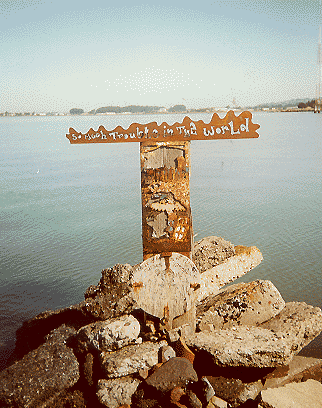
Ten Myths About the Freebox, by Carol Denney October 17, 2005
People’s Park, a City of Berkeley landmark, has a tradition of free exchange. The tradition of sharing food, sharing music, trading clothing, giving away helpful information (and yes, sometimes love) without compensation is more than 35 years old. The freebox, one of the best examples of this tradition, is simply a box into which one puts old or simply unwanted items for the next person to use, and takes whatever interests them.
The university has recently threatened a group of community gardeners and park supporters wishing to replace the traditional freebox. Reconstruction efforts are suddenly surrounded by police who videotape everyone’s every move, and tensions are high enough that community residents and city officials currently share a concern about keeping the peace.
Before the situation becomes more heated, here is some information about the freebox tradition.
“The freebox is for the poor.” Not true. The freebox is for everyone. As you drop something off, you might see a jacket that interests you just because of its pretty color. Try it on, enjoy it for a time, and put it back in the box when you’re done.
“The freebox is for clothes.” How silly. The freebox is for books, dolls, toys, kitchen items, anything you don’t plan to use that you suddenly see is simply taking up space in your life. Let someone else enjoy it for awhile, and save yourself a trip to the recycling center.
“It’s wrong to sell the freebox clothes.” This is silly, too. The freebox in People’s Park gets so many donations that the people who grab an armful of clothing to try to resell it for money (and good luck with that) are a blessing. If the next guy wants to make quilts out of clothing, that’s alright too, and no longer the business of the donor. Some people have deliberately donated signed T-shirts from celebrities hoping somebody noticed the signature and either had a really great day or made a bundle on EBay.
“It’s wrong to take clothes for yourself.” Not true. The freebox is a great place to get inspiration for the Halloween costume of your dreams.
“It’s wrong to take clothes for others.” Again, who makes this stuff up? When you see the purple wig you know would make your friend’s heart dance, just sitting there in the freebox, take it.
“The clothes are just for wearing; for instance, you shouldn’t take the shoelaces out of the shoes.” This may be inconvenient for people who want the shoes with laces intact, but one local doll-maker used to do this and create fabulously inventive artwork. Quilts, artwork, it is all okay.
“The freebox is a ‘park’ thing.” Not entirely. The park’s surrounding blocks often sprout cardboard freeboxes from time to time, and other more durable
freeboxes exist in west, south, and north Berkeley. “The people who congregate around the freebox are selfish, agressive crackheads.” You’ll hear this a lot, but if at times it’s true, it’s beside the point. Selfish, aggressive people get to use the freebox, and the park, and the streets, and the sidewalks. That’s life. But we’re not rolling up the streets because we don’t like some of the people walking by. The absence of the freebox for the last six months didn’t cure the world of selfishness or drug abuse, if that’s what the university thought would happen, so there’s no need to deprive the park of its traditions. The answer to selfishness might be more, rather than less, freeboxes.
“The freebox needs to be cleaned up and supervised.” Maybe. If so, the park has never in its entire history had so many paid staff members and volunteers at the ready to do just that if they weren’t so busy tossing armloads of clean, useable clothing in the dumpsters and locking them down. But it would be a worthy experiment, alternatively, to allow interested community members to build, plant, play, and create in the park without the current constant threat of arrest or SLAPP-suit action, allowing the park’s natural community to reconvene and help out. Lots of people mess up the clothes, but lots of others fold them. It’s kind of like the sweater piles at the GAP stores, except nobody gets paid.
The university just hates the freebox. Again, maybe. Maybe the university just hates the park, too. But maybe we’ve also come a long way as a community, and maybe we’re capable of working out our differences without arrests, lawsuits, and violence. Understanding the freebox as a tradition is a small, but worthy first step.
